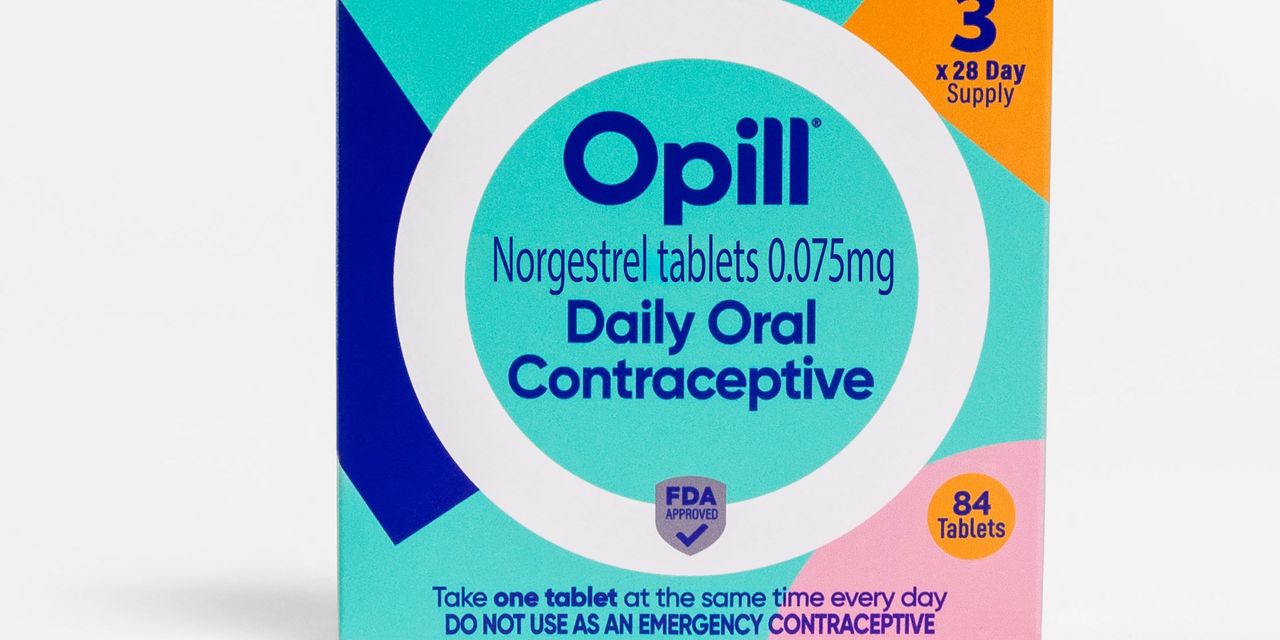With over-the-counter birth control pills headed to pharmacy shelves early next year, big questions remain about costs and accessibility, according to new research from health-policy research nonprofit KFF.
When the U.S. Food and Drug Administration in July approved the first daily over-the-counter birth control pill, Perrigo Co. PLC’s
PRGO,
Opill, reproductive health researchers and advocacy groups emphasized that equitable access would depend on pricing and insurance coverage. But the KFF report released Thursday highlighted a slew of potential obstacles for people looking to get easy, low-cost access to the pill.
The patchwork of federal and state laws governing coverage requirements, billing issues, and consumers’ and pharmacists’ lack of awareness of coverage rules and benefits are all contributing to the problem, according to the KFF study, which was based on interviews with about 80 experts including pharmacists, health plans and state Medicaid officials. Without additional federal guidance or regulations, KFF said, coverage of the over-the-counter pill will depend on where you live and what type of health plan you have.
Federal law generally requires most private health plans to cover FDA-approved contraception, but plans often require a prescription to trigger that coverage, according to KFF. Some states, including New Jersey, New York and Washington, require state-regulated private health insurance plans to cover some types of over-the-counter contraception without a prescription. However, the vast majority of states have not taken action to expand coverage of non-prescription contraception, according to the report. And most people enrolled in employer-sponsored health coverage are in self-funded plans, which aren’t subject to state coverage requirements.
Perrigo has not yet announced a price for Opill, which is expected to be available early next year. Another company, Cadence, is also developing an over-the-counter pill but is still working toward FDA approval.
Perrigo did not immediately respond to a request for comment on the KFF report and Opill’s pricing. The company has previously said that it is working to get Opill covered by private insurers and Medicaid and establishing a patient-assistance program to help cover costs.
Cadence has not publicly announced pricing for its pill, Zena, but “it’s fair to say it will be less than $19 per month,” spokesperson Angela Bitting told MarketWatch. The KFF study, Bitting said, “highlights the need for insurance companies to cover over-the-counter access,” adding that Cadence is “equally concerned about access and affordability for those who do not have insurance, so price matters.”
In June, one year after the U.S. Supreme Court overturned the constitutional right to an abortion, President Joe Biden issued an executive order calling for better access to contraception, including expanded access to affordable over-the-counter contraception methods.
Yet plenty of barriers remain, KFF found. Even in cases where state-regulated plans cover over-the-counter contraception, consumers who want coverage generally have to pick up the product at an in-network pharmacy counter — where the pharmacist can submit a claim to the plan — or buy the product at the cashier and submit a claim for reimbursement. That “could pose financial and logistical barriers by requiring enrollees to pay the cost upfront and navigate the plan’s reimbursement process,” the report said.
Health plans in states that have such coverage requirements said claims for over-the-counter contraception are rare, suggesting many consumers and pharmacists may not be aware of the benefit, the study said. Some pharmacists interviewed by KFF also said they feared that billing health plans for non-prescribed contraceptives could trigger an audit from pharmacy benefit managers, the prescription-drug middlemen who manage benefits on behalf of insurers, employers and other payers.
For people on Medicaid, federal law generally requires a prescription for coverage of drugs and products. Some states independently fund coverage of over-the-counter contraceptives for Medicaid enrollees–but consumers and pharmacists often aren’t aware of the benefit or are confused about the billing process, according to KFF.
State Medicaid programs don’t advertise the benefits directly to enrollees, outside of the member handbook, the report said. Pharmacists sometimes turn away people who are trying to get over-the-counter contraception because “they either think they cannot dispense it without a prescription, or they feel Medicaid requires a prescription” for coverage, one unnamed state Medicaid official told KFF, according to the report.
Pharmacies could set up additional barriers to access, the report said, because they sometimes put over-the-counter contraceptives behind the pharmacy counter or in a locked cabinet due to shoplifting concerns.
Read the full article here













Leave a Reply